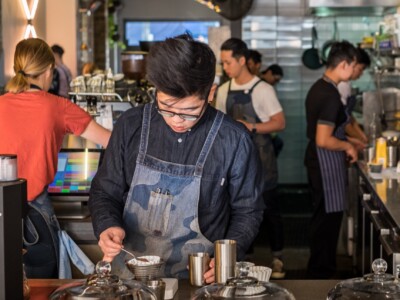The retail and hospitality industry make up over 20 percent of the workforce in the U.S., according to the Bureau of Labor Statistics. These jobs, often seen as low-skill or temporary, require training, commitment and emotional labor at a price that still leaves many people classified as working poor. As Texas finally begins to address wage increases through proposed legislation this session, it is equally important to recognize labor through a more humanistic and socially valued perspective.
Recently, U.S. Rep. Alexandria Ocasio Cortez, D-N.Y., was called out by President Trump. He mockingly asserted that the Green New Deal proposal was written by a “young bartender,” using a tone of shame about her working-class background. Her response was simple: “There is nothing wrong with working retail, folding clothes for other people to buy. There is nothing wrong with preparing the food that your neighbors will eat. There is nothing wrong with driving the buses that take your family to work.”
Retail alone makes up half of consumer spending, but our society does not respect people working these jobs. Forty-two percent of Americans working in hospitality and 36 percent working in retail say that they get a sense of identity from their jobs.
It was also hard work: standing on my feet for long shifts, paired with constant conversation, took a toll on my body and mood. Throughout that period, I experienced shame working in the service industry. The small-talk conversations at family gatherings or with old friends invoked a kind, but subtle, disappointment. I felt a burden to prove myself and my abilities to my friends, familyand society. This sentiment shines a light on a classist issue that is at the root of most rhetoric in our country today. Our society values certain professions over others, while simultaneously minimizing the demands of those working service, retail and hospitality, which is the fastest growing industry in the U.S.
Six out of 10 Americans are paid an hourly wage. In Texas, the current minimum wage sits pathetically at $7.25 per hour, but there are multiple bills currently under review in the Legislature that propose an increase to at least $10.10.
Ivanka Trump was recently quoted in an interview saying that “most people want to work for what they get and a guaranteed minimum is not something most people want.” Having never worked a retail or service job in her life, Trump misses two critical issues. One: Increased wages are the most critical need of the working poor. Two: Beyond wages, many needs are still not met due to insufficient hours of work being available.
Of those earning $30,000 or less and only working part time, 51 percent would prefer to be working full time. As wages increase, many corporations are cutting or adjusting available hours through what is called workplace optimization systems — programs that are based on varying consumer demand — not workers’ employment needs. As wages may increase, demands also will evolve to address the need for consistency of hours, which truly equates to a value of work and identity. As basic needs become met, people are able to find joy and meaning in their work.
So, in addition to an increase to the minimum wage, it is important to create a culture that does not discriminate between labor. Claiming that all needs can be met through increased wages alone without intersectional discussions about wage discrimination, available work and personal identity will only perpetuate disparities between working-class communities and those who sit in an ivory tower or on Capitol Hill .
Foster is a graduate student at the Steve Hicks School of Social Work at the University of Texas at Austin. This opinion piece was published in the Houston Chronicle. The piece represents the views of the author, not of The University of Texas at Austin or the Steve Hicks School of Social Work.


